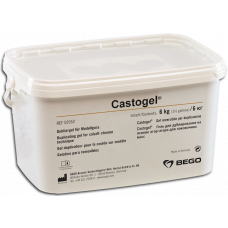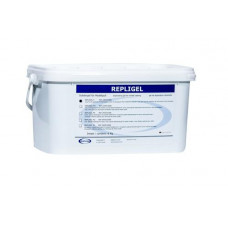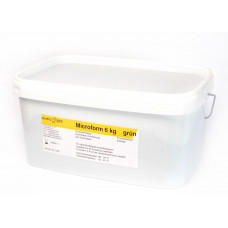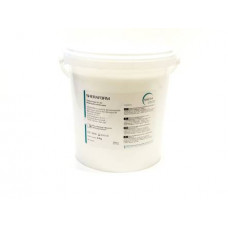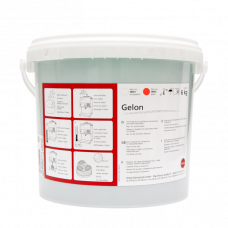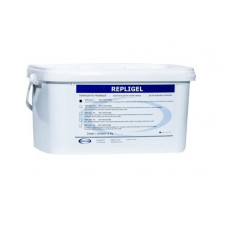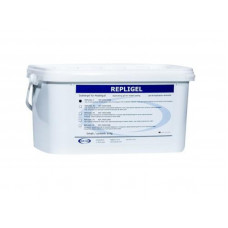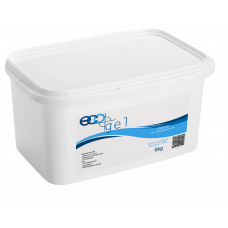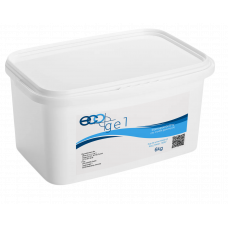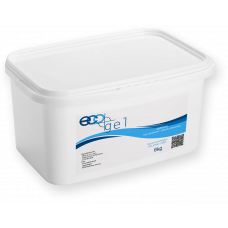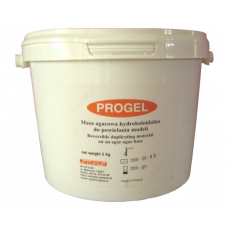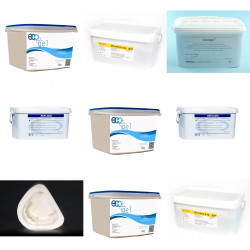
What is agar and what is it for ?
Agar is a material composed primarily of water and marine algae. It shows high precision in making molds, but less than silicone, therefore it is rather not used to duplicate models for combined and precise works. The advantage of agar is its low price and the possibility of multiple use. The disadvantage is the long preparation process, the short lifetime of the mold, and in the case of duplicating the models in the refractory mass, the disposability of the matrix made. Making an agar mold begins with melting it, i.e. bringing it to a liquid state. For this purpose, the agar is diced with a regular knife and thrown into an agar dish. The smaller the cube, the faster the agar dissolves.
Castogel agar 6kg
Agar Castogel is a special duplicating mass intended for making precise skeletal dentures and combined works.
Characteristics:
- High accuracy of reproduction of even the smallest details.
- Tear-resistant duplication form.
- Exceptional flexibility.
- Very high durability, when heated once a day, it can be used for about 4 weeks.
Packaging:
- 6kg.
Repligel PG - agar for duplicating plaster models
Repligel PG is an agar mass suitable for duplicating plaster models. Thanks to the use of a special recipe, the surface of the cast negative remains dry after the agar sets and does not react with the plaster model. The material allows you to obtain high-quality duplicate models even with sharp contours and deep undercuts. Repligel PG can be used repeatedly, just like traditional agar - this allows for a significant reduction in the cost of duplicating models - we recommend it especially to technicians who work with the thermal injection method of acetal and nylon.
Instruction:
The gel should be cut into small pieces (the smaller the better) and placed in an agar pot or other melting device. Heat to 90-95 °C, stirring constantly. Mixing prevents lumps from forming and helps obtain a uniform gel consistency. Avoid overheating the gel (boiling) because it causes water to evaporate and shortens the shelf life of the product. To minimize water evaporation, keep the agar pot closed during heating. Never add water when melting agar for the first time.
After melting, the gel must be cooled to 47-48 °C.
Before duplicating, place the model in warm water for 15-20 minutes to "soak" it.
ATTENTION:
Before duplicating the model on the surface, it must be absolutely dry to prevent water from the plaster surface from reacting with the agar.
Setting time at room temperature is approximately 1 hour.
After releasing the model, the agar should be washed and closed in a container until re-use - this process (washing) also replenishes the water lost during melting.
However, add 50-100 ml of water per 6 kg of gel if the gel dries out during storage.
Characteristics:
- Accurate reproduction of details.
- Tear-resistant.
- High durability.
- Pink color
Packaging:
- 6kg
Microform agar 6kg
Agar Microform is a special duplicating mass intended for making precise skeletal dentures and combined works.
Characteristics:
- Tear-resistant form.
- Very flexible.
- High durability.
- Green color.
Packaging:
- 6kg.
Shera - Sheraform 6kg
White material for duplicating agar-based models. Very precise - its consistency resembles silicone.
Features:
- White color
- extremely durable material
- very smooth casting surfaces - qualitatively comparable to the effects of silicone
- tear resistance
- reusable mass
Instruction:
- When using for the first time, do not add water.
- The melting point should not exceed 90/92 degrees C, higher melting point may damage the mass.
- Stir until the mass is completely liquid, otherwise it will be lumpy.
- Before doubling, irrigate the model in lukewarm water for 15 to 30 minutes.
- Working temperature 45 to 50 degrees C
- Setting time minimum 60 minutes
- If cold water is used to cool the agar to accelerate setting, allow the mold to warm to room temperature before pouring in the investment material.
- Add 50 to 100 ml of water for re-use.
When melting the mass in a microwave:
- Cut the agar into small pieces, add water and stir, then pour off the water.
- Put the prepared mass into the microwave in a non-metallic container.
- Switch the device on for 60 seconds at full power.
- Remove and stir for about 30 seconds.
- Repeat points 3 and 4 2 or 3 times until the weight is approximately 84 degrees C.
- Pouring the prepared model with agar.
Package:
- 6kg
Agar Gelon 6kg
Agar Gelon is a special duplicating material designed for the fabrication of precision partial dentures and combination work and dentures using the infusion method.
It melts very well in the microwave!
Color:
- green
Packaging:
- 6kg.
Agar Repligel PD 6kg for the infusion method
REPLIGEL is perfect for demanding partial dentures. It creates a tear-resistant, very flexible form for duplicating, which does not cause any problems even with undercuts. High-quality base material ensures exceptionally long durability.
- PD perfect for the acrylic pouring method.
Characteristics:
- Possibility of melting in the microwave.
- Very accurate and tough.
- Blue color.
Packaging:
- 6kg
Agar Repligel P 6 kg for skeletons
Thanks to its excellent accuracy in reproducing even the smallest details, REPLIGEL is perfect for demanding partial dentures. Creates a tear-resistant, highly flexible duplication mold that does not cause any problems with undercuts. High-quality base material ensures exceptionally long durability.
Characteristics:
- Pink color.
- For duplicating models made of investment material.
Packaging:
- 6kg
EcoGel agar for duplicating plaster models, pink, 6kg
Pink agar for duplicating plaster models in the technique of making prostheses from thermoplastic materials (Can be used instead of silicone).
Instruction:
- The gel should be cut into small pieces (the smaller the better) and placed in an agar pot or other melting device. Heat to 90-95°C, stirring constantly.
- Mixing prevents lumps from forming and helps obtain a uniform gel consistency.
- Avoid overheating the gel (boiling) because it causes water to evaporate and shortens the shelf life of the product.
- To minimize water evaporation, keep the agar pot closed during heating.
Never add water when melting agar for the first time.
After melting, the gel must be cooled to 47-48°C.
Before duplicating, place the model in warm water for 15-20 minutes to "soak" it.
ATTENTION:
Before duplicating, wipe the surface of the model; the model must be absolutely dry to prevent water from the plaster surface from reacting with the agar.
Setting time at room temperature is approx. 1 hour.
After releasing the model, the agar should be washed and closed in a container until re-use - this process (washing) also replenishes the water lost during melting.
However, add 50-100 ml of water per 6 kg of gel if the gel dries out during storage.
Packaging:
- 6kg.
EcoGel agar for duplicating plaster models, transparent, 6kg
Transparent agar for duplicating plaster models in the technique of making prostheses from thermoplastic materials (Can be used instead of silicone).
Instruction:
- The gel should be cut into small pieces (the smaller the better) and placed in an agar pot or other melting device. Heat to 90-95°C, stirring constantly.
- Mixing prevents lumps from forming and helps obtain a uniform gel consistency.
- Avoid overheating the gel (boiling) because it causes water to evaporate and shortens the shelf life of the product.
- To minimize water evaporation, keep the agar pot closed during heating.
Never add water when melting agar for the first time.
After melting, the gel must be cooled to 47-48°C.
Before duplicating, place the model in warm water for 15-20 minutes to "soak" it.
ATTENTION:
Before duplicating, wipe the surface of the model, the model surface must be absolutely dry to prevent water from the plaster surface from reacting with the agar.
Setting time at room temperature is approximately 1 hour.
After releasing the model, the agar should be washed and closed in a container until re-use - this process (washing) also replenishes the water lost during melting.
- However, add 50-100 ml of water per 6 kg of gel if the gel dries out during storage.
Packaging:
- 6kg
EcoGel-agar green for duplicating models 6 kg + can for duplicating models for free!!!
Agar for duplicating models, when making skeletal dentures and for the "infusion" method
Packaging:
- 6kg
Agar Progel 2kg
Agar Progel is an agar hydrocolloid mass for duplicating models, intended for the production of skeletal dentures and combined works. Flexible, thermally reversible, reusable. Temp. working 45 ° C. It reproduces the finest details accurately. Low temperature handling reduces shrinkage and optimizes the result.
Characteristics:
- Accurate mapping of details.
- Tear-resistant.
- High durability.
Package:
- 2kg

